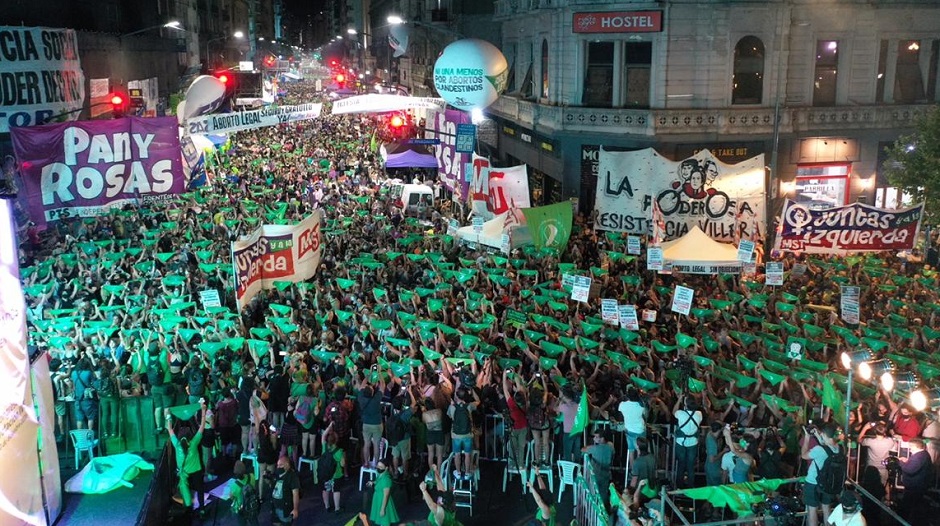Thousands of activists from both sides waited for 20 hours outside the Parliament building. Evangelicals hope the Senate will vote against the law, as it happened in 2018.
 Pro-abortion demonstrators in Buenos Aires, Argentina, December 2020. / Twitter @PorAbortoLegal
Pro-abortion demonstrators in Buenos Aires, Argentina, December 2020. / Twitter @PorAbortoLegal
Argentina is witnessing again how abortion divides the country. The low chamber of the Congress passed on 12 December the draft law that would allow women to abort in the first 14 weeks of pregnancy.
In a close vote - 131 votes for, 117 against and 6 abstentions -, pro-choice parliamentarians obtained a victory that was celebrated enthusiastically by thousands of ‘green kerchiefs’ (as the pro-choice movement is known) that were following the debate in the dark outside the Palace of Congress in capital Buenos Aires.
“Legal abortion in the hospital” was one of the most repeated chants of a crowd that had followed the 20-hour long debate.
On the other side of the large square of the Congress and separated by a fence, pro-life supporters (known as ‘light-blue kerchiefs’) expressed their disappointment with tears and hugs.
According to the text of the draft law, women aged 16 or older will be able to abort in the first 14 weeks of pregnancy. Until now, it was only legal to have an abortion if there was a clear risk for the safety of the mother or the pregnancy was a consequence of rape.
President Alberto Fernández had promised in the electoral campaign last year that he would push hard to pass the voluntary abortion draft law that did not succeed in 2018. In August that year, the Senate voted against the law that had been passed by the Deputies chamber.
In 2018, Christians and other members of civil society took the streets around Argentina in massive demonstrations “for the two lives”. More than half a million asked the Senators to stop a law that would be the third of its kind in Latin America, after Uruguay and Cuba.
Pro-life groups now hope the history will repeat itself. One of the arguments to stop the Bill is that the American Convention of Human Rights states that “life is protected, and generally, from the moment of conception”.
In 2019, the Argentinian March for Life gathered again hundreds of thousands, demanding “public policies to accompany women in a situation of vulnerability and children at risk”, as well as improvements in the adoption system and the safety measures against child abuse. Two weeks ago, they took the streets again.
# Aborto | Miles de pañuelos celestes se hicieron presentes en el debate de la Cámara de Diputados, donde el aborto obtuvo media sanción. pic.twitter.com/vZKQmGhAIe
— Alt Media (@AltMediaOK) December 11, 2020
The debate around abortion has been one of the most polarising issues in Argentina in recent years. In 2018, radical feminist groups attacked churches.
Now heated debates on television between activists on both sides reflect the social polarisation, also seen in aggressive language on social media.
Evangelical politician and pro-life activist Nadia Márquez believes pro-abortion activists do not represent the majority of the country and says the claims that many women are dying because of illegal abortions have no statistical support. “Radical feminists are trying to make us believe that maternity is something very risky”, she complains.
The Christian Alliance of Evangelical Churches of Argentina (ACIERA) expressed its rejection to pass the abortion law, but added that “dissent, even on issues as serious as the defence of life, must occur in an attitude of dialogue and respect for differences”.
The Roman Catholic Church, led by the Argentinian Pope Francis, has also mobilised its churches against the law. They have asked the parliamentarians “to take a second before voting to reflect on what it means to respect life”.
Last week, pro-life demonstrators camping in front of the parliament denounced the use of violence of the police to disperse a protest outside the parliament. For a long time, pro-life organisations have also denounced verbal abuse and death threats coming from members of radical pro-abortion groups.

Las opiniones vertidas por nuestros colaboradores se realizan a nivel personal, pudiendo coincidir o no con la postura de la dirección de Protestante Digital.
Si quieres comentar o